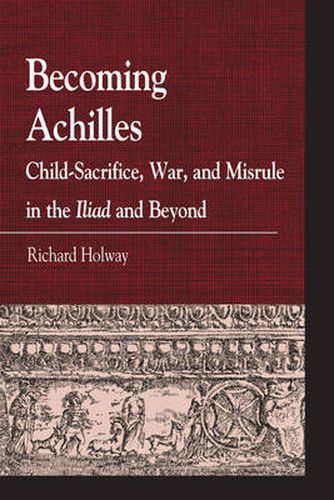Readings Newsletter
Become a Readings Member to make your shopping experience even easier.
Sign in or sign up for free!
You’re not far away from qualifying for FREE standard shipping within Australia
You’ve qualified for FREE standard shipping within Australia
The cart is loading…






Viewing the Iliad and myth through the lens of modern psychology, in Becoming Achilles: Child-Sacrifice, War, and Misrule in the Iliad and Beyond, Richard Holway shows how the epic underwrites individual and communal catharsis and denial. Sacrificial childrearing generates but also threatens agonistic, glory-seeking ancient Greek cultures. Not only aggression but knowledge of sacrificial parenting must be purged.
Just as Zeus contrives to have threats to his regime play out harmlessly (to him) in the mortal realm, so the Iliad dramatizes threats to Archaic and later Greek cultures in the safe arena of poetic performance. The epic represents in displaced form destructive mother-son and father-daughter liaisons and resulting strife within and between generations.
Holway calls into question the Iliad’s (and many scholars’) presentation of Achilles as a hero who speaks truth to power, learns through suffering, and exemplifies kingly virtues that Agamemnon lacks. So too the Iliad’s cathartic process, whether conceived as purging innate aggression or arriving at moral clarity. Instead, Holway argues, Achilles (and Socrates) try to prove they are not what at bottom they experience themselves to be-needy, defenseless children, who fear to acknowledge, much less speak out against, parents’ use of them to meet parents’ needs.
What emerges from Holway’s analysis is not only a new reading of the Iliad, from its first word to its last, but a revised account of the family dynamics underlying ancient Greek cultures.
$9.00 standard shipping within Australia
FREE standard shipping within Australia for orders over $100.00
Express & International shipping calculated at checkout
Viewing the Iliad and myth through the lens of modern psychology, in Becoming Achilles: Child-Sacrifice, War, and Misrule in the Iliad and Beyond, Richard Holway shows how the epic underwrites individual and communal catharsis and denial. Sacrificial childrearing generates but also threatens agonistic, glory-seeking ancient Greek cultures. Not only aggression but knowledge of sacrificial parenting must be purged.
Just as Zeus contrives to have threats to his regime play out harmlessly (to him) in the mortal realm, so the Iliad dramatizes threats to Archaic and later Greek cultures in the safe arena of poetic performance. The epic represents in displaced form destructive mother-son and father-daughter liaisons and resulting strife within and between generations.
Holway calls into question the Iliad’s (and many scholars’) presentation of Achilles as a hero who speaks truth to power, learns through suffering, and exemplifies kingly virtues that Agamemnon lacks. So too the Iliad’s cathartic process, whether conceived as purging innate aggression or arriving at moral clarity. Instead, Holway argues, Achilles (and Socrates) try to prove they are not what at bottom they experience themselves to be-needy, defenseless children, who fear to acknowledge, much less speak out against, parents’ use of them to meet parents’ needs.
What emerges from Holway’s analysis is not only a new reading of the Iliad, from its first word to its last, but a revised account of the family dynamics underlying ancient Greek cultures.